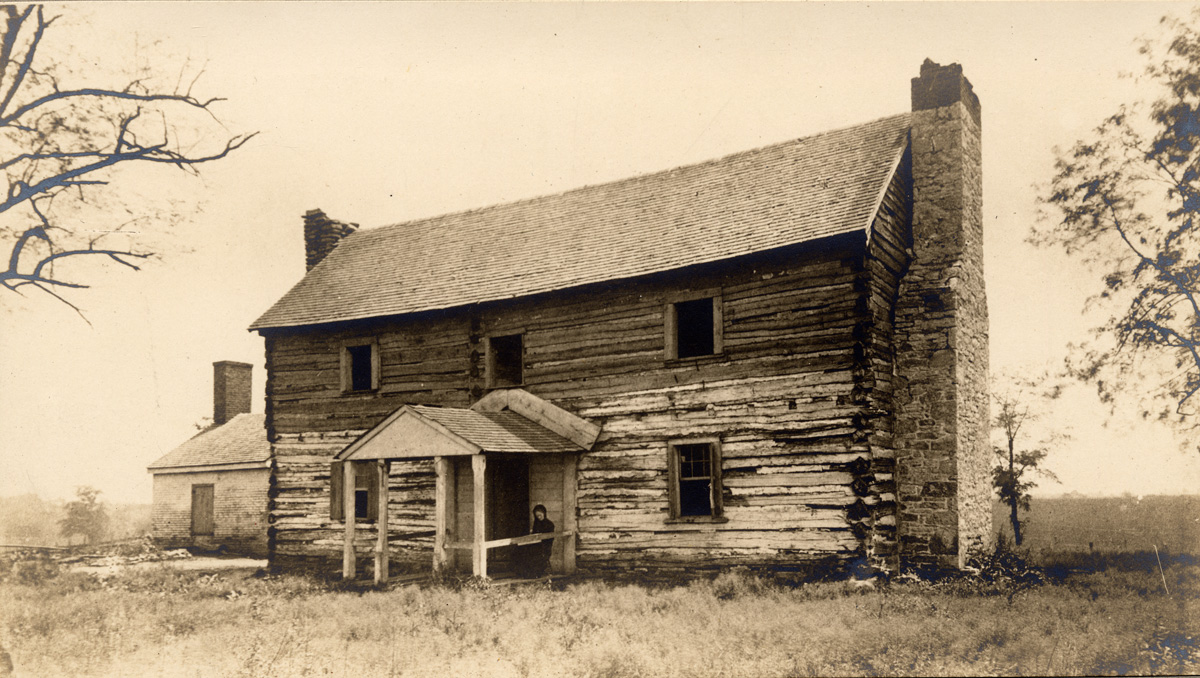Falls of the Ohio, KY-IN Clark and Lewis share wine with Thomas Rodney on his bateaux moored at Louisville, and Rodney mistakenly thinks George Rogers Clark is Williams father. In Washington City, Thomas Jefferson gives his third Annual Message to Congress.
The Clark home known as “Mulberry Hill,” built under the supervision of Jonathan and George, William’s older brothers in 1783-84, by slaves who included Old York, the father of William Clark’s personal slave, who was also called York. The rest of the Clark family, including 14-year-old William, arrived here in March 1785. In 1799, William inherited the house from his father, and in 1803 sold it to Jonathan. It remained in the Clark family until its collapse in the early 1900s. This photo was taken about 1890.
Visiting Colonel Rodney
In the evening Captain Lewis and his companion Captain Clark, son of Genl. Clark, called at our boat to see us and took a glass of wine with us and bid us adieu. They do not go off till next week, yet as they have a better boat and will be strong handed they expect to overtake us tho we shall set off tomorrow.
—Thomas Rodney[1]17 October 1803. Dwight L. Smith and Ray Swick, ed., A Journey Through the West: Thomas Rodney’s 1803 Journal from Delaware to the Mississippi Territory (Athens: Ohio University Press, 1997), … Continue reading
In fact, Lewis and Clark would not overtake Rodney’s batteaux. Rodney turned down the Mississippi on 9 November, and Lewis and Clark arrived at Fort Massac—a few miles upstream from the Mississippi—on 11 November 1803.
Old General Clark
Rodney’s assumption that General George Rogers Clark was the father—rather than the older brother—of William (see above), can be understood in the context of this 1805 description of the older brother:
General Clark has now become frail and rather helpless, but there, are the remains of great dignity and manliness in his countenance, person and deportment, and I was struck on seeing him with (perhaps) a fancied likeness to the great and immortal Washington.
—Josiah Epsy[2]Josiah Epsy, Memorandums of a Tour Made by Josiah Epsy in the States of Ohio and Kentucky and Indiana Territory in 1805 (Cincinnati: Robert Clarke & Co., 1870), 14
Jefferson’s Annual Message to Congress
To the Senate and House of Representatives of the United States:
With the wisdom of Congress it will rest to take those ulterior measures which may be necessary for the immediate occupation and temporary government of the country; for its incorporation into our Union; for rendering the change of government a blessing to our newly adopted brethren; for securing to them the rights of conscience and property; for confirming to the Indian inhabitants their occupancy and self-government, establishing friendly commercial relations with them, and for ascertaining the geography of the country acquired.
. . . . .
Another important acquisition of territory has also been made since the last session of Congress. The friendly tribe of Kaskaskia Indians, with which we have never had a difference, reduced by the wars and wants of savage life to a few individuals, unable to defend themselves against the neighboring tribes, has transferred its country to the United States, reserving only for its members what is sufficient to maintain them in an agricultural way.[3]Annals of Congress, 7th Cong., 11–13 at “A Century of Lawmaking,” Library of Congress, accessed 11 August 2022, … Continue reading
Notes
| ↑1 | 17 October 1803. Dwight L. Smith and Ray Swick, ed., A Journey Through the West: Thomas Rodney’s 1803 Journal from Delaware to the Mississippi Territory (Athens: Ohio University Press, 1997), 124. |
|---|---|
| ↑2 | Josiah Epsy, Memorandums of a Tour Made by Josiah Epsy in the States of Ohio and Kentucky and Indiana Territory in 1805 (Cincinnati: Robert Clarke & Co., 1870), 14 |
| ↑3 | Annals of Congress, 7th Cong., 11–13 at “A Century of Lawmaking,” Library of Congress, accessed 11 August 2022, https://memory.loc.gov/cgi-bin/ampage?collId=llac&fileName=013/llac013.db&recNum=3. |

